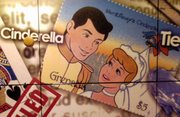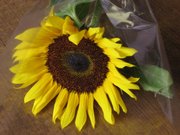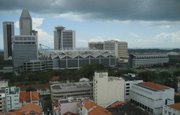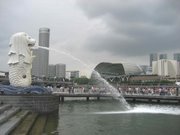QotW6: Do not imagine how I look like online
Kate: So what are you doing now?
Chloe: I’m getting my blog done.
Kate: What’s a blog?
Chloe: It’s an online diary, where you write about your personal life and it’s then published on the Internet.
Kate (surprised): Then how can it be personal? Aren’t diaries supposed to be personal?!
If this looks like a familiar conversation on what blogs are, it probably may have occurred to you when blogs started to become popular in Singapore around 4 years ago.
I personally thought blogs were a contradictory idea - on one hand, they are supposed to hold one’s innermost thoughts and are private, yet on the other hand, the nature of web logs leaves one’s thoughts open to the rest of the world. As mentioned by Rosen (2004) in The Naked Crowd, even the most intimate moments of life, such as a wedding, are now being posted on the web for public consumption. Yet, to what extent is our privacy being compromised?
Do not diversify…
I never thought that I would have to start a blog but once I did, the first thing I had to decide was how much information I wanted to reveal. As noted by Rosen (2004), the growing pressure to expose ourselves in front of strangers has obvious and important consequences for a democracy's ability to strike a reasonable balance between liberty and security. The key in blogging is to strike a balance between one’s privacy while having the freedom to write unreservedly. No one wants to be stalked after writing their entries but it is easy to piece together a person’s identity and lifestyle if he writes freely on almost any aspect of his life. As succinctly summarized by Sullivan (2006), the digital bread crumbs you leave everywhere make it easy for strangers to reconstruct who you are, where you are and what you like. Compared to blogs that are very specialized and feature only 1 aspect (such as food, pets, selling handmade jewelry), blogs that feature many aspects of a person’s life make it easier for anyone to find out who they really are, simply by piecing information together.
Do not try and guess how I look like…
Hence, to negotiate my privacy for my blog, the first thing I do is to not put any personal information about where I stay, what my phone number is or even how I look like on the blog. As noted by Mr Kevin Lim during one of his lectures on “Online Identities”, he said that sunglasses (in blogs) are a must! Well, this is perhaps true to a certain extent as it is difficult to ascertain how a person looks like without able to see his/her eyes. Another way to prevent people from knowing how you look like is to show one part of your face without showing the whole profile. While my eyes can be seen in my self-introduction to this blog, the rest of my face is covered. This is just one way to prevent people from visually knowing how the blogger looks like and while there are preventive methods (such as to distort or crop photos), the best way is to not place a picture of oneself.
Do not think I am merely 1 facet…
While there are many facets of my blog that people can read about, the main thing that stands out the most are my photographs to capture the reader's attention. Pictures capture a thousand words and photographs are no exceptions. They are snapshots of my life and perhaps, do tell a story of my life. However, I am mindful of what people know about me through my photos, so I tend to post photos of interesting places or beautiful sunsets that I capture from time to time. If one wants to protect his privacy by not placing a photo of himself on his blog, it is also advisable not to place photos of his neighbourhood, his friends, his office location or anything that can be traced back to him (besides knowing how he looks like). To put it simply, Do Not Give Away Any Identifying Details. Even the Electronic Frontier Foundation (2005) gives this practical advice: don't use real names or post pictures of yourself.
While the main function of this blog is to be an academic blog, it is also meant to be a photoblog. However, it is up to my discretion on what kind of photos I want to upload and I chose not to upload pictures that my reveal my identity or the identity of my friends or family.
Do not imagine this to be the end…
In conclusion, there are many ways to negotiate one’s privacy online. In blogging, I feel that the most practical way to prevent people from identifying a blogger is not to post any pictures that may easily identify who the blogger is or where he/she works, lives or who the family and friends are. It is so easy to piece together one’s identity through the style and content one writes, so why make it easier for stalkers to know how you look like by placing photos of yourself?
References:
How to Blog Safely (About Work or Anything Else). (2005, May 31). In Electronic Frontier Foundation. Retrieved March 10, 2007, from http://www.eff.org/Privacy/Anonymity/blog-anonymously.php
Sullivan, B. (2006, October 17). Privacy Lost: Does anybody care? [Article posted on Web site MSNBC.com]. Retrieved March 10, 2007, from http://www.msnbc.msn.com/id/15221095/print/1/displaymode/1098/
Rosen, J. (2004, July 19). The Naked Crowd. [Article posted on Web site Spiked-online.com]. Retrieved March 10, 2007 from http://www.spiked-online.com/Printable/0000000CA5FF.htm











1 comment:
Good that you highlighted the contradictions that blogs pose: private vs. public.
Full grades.
Post a Comment